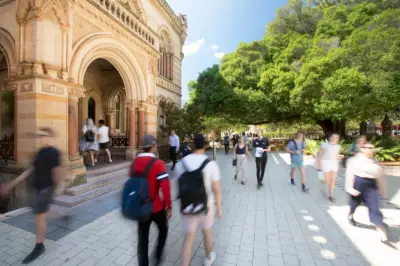
Early Entry Offers Provide Crucial Safety Net for HSC Students
New Australian research has delivered a powerful counter-narrative to the common assumption that Year 12 students who receive early university entry offers reduce their effort in final exams. A significant study from the University of Newcastle reveals that these offers act as a vital safety net, alleviating immense psychological pressure while maintaining academic motivation.
Hunter School of the Performing Arts graduate Nora Prieto experienced this firsthand. After receiving an early entry offer for her dream course—chemical engineering at the University of Newcastle—during her trial exams, the overwhelming stress of the HSC became more manageable. "I'm very interested in maths and science because I think there are good opportunities in that field," Nora explained. She also secured an offer for an economics degree at the University of Technology Sydney.
Research Overturns 'Slacking Off' Stereotype
Dr Sally Patfield, a lecturer from the University of Newcastle's School of Education, conducted the research in collaboration with the Teachers and Teaching Research Centre. Her findings directly challenge the perception that students with early offers disengage. "Students who receive an early entry offer were portrayed as 'slacking off', but my research found the opposite," Dr Patfield stated.
She detailed how these offers can boost student confidence, which then carries forward into their university studies. Furthermore, some students reported feelings of 'impostor syndrome', driving them to prove they deserved their place through strong HSC results. A strong sense of responsibility to peers also motivated students, as they did not want to let down classmates by not contributing to overall school performance.
Wellbeing and Equity at the Heart of Early Entry
The research highlights the profound impact on student mental health during a critical life transition. "With the transition to adulthood recognised as the peak period for the onset of mental ill-health, the impact of an early entry offer can therefore be significant," Dr Patfield said. Students reported feeling that their health and wellbeing were finally being acknowledged as important.
Perhaps most importantly, early entry offers can help mitigate hardship and disadvantage. By assessing success through alternative means like school-based tasks or principal recommendations, they open university doors for students who might otherwise believe higher education is beyond their reach. Dr Patfield emphasised the multitude of pathways into university, reminding students that "their results don't define them in any way."
For Nora, who needed an ATAR of 94 for her Sydney option, the Newcastle offer was a relief. "Once I knew I was in for this degree [at Newcastle], I just was like yeah, I'll take that," she said. Her advice to incoming Year 12 students is simple: "don't put too much pressure on yourself." She added, "There are so many options to get into uni that it's fine if you don't get the ATAR score that you want."
This academic year, nearly 3000 students received Early Entry offers from the University of Newcastle. Enrolments open on Monday, November 17, with the first semester commencing on Tuesday, January 27, 2026. ATAR results will be released on December 18, followed by the first main UAC offer round on December 23.





